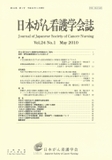Japanese
English
- 販売していません
- Abstract 文献概要
- 参考文献 Reference
- サイト内被引用 Cited by
要旨
本研究の目的は,子宮全摘出術を受けたがん患者が術後,いかに性的自己価値の認識を行い配偶者との関係を再構築してきたのか,辿ってきた心理的プロセスを明らかにし看護支援の検討を行うことである.
半構成的面接法により対象者9名からデータ収集を行い,修正版グランデッド・セオリー・アプローチ(M-GTA)を参考に質的帰納的分析を行った.
子宮全摘出術を受けたがん患者は,【性的関係性の構築体験】と【配偶者との親密性の強化体験】を関連させ,配偶者との関係性を再構築している.【性的関係性の構築体験】においては〔性的自己価値観の動揺〕と〔性的自己価値喪失感の克服〕を体験している.動揺体験では,<性的自己価値の喪失感>,<性的変化の現状認識>,<性交による創部刺激への不安>,<性の情報取得へのためらい>,<配偶者の性的欲求の尊重>,<性交許可で自覚するジレンマ>を生じている.克服体験では,自己価値を再認識する過程において,性生活の実施を巡り3通りの体験があった.1つ目は,性交を避けては通れない大切なことと捉え<性交時の苦痛軽減への努力>を行い<性的自己価値の再認識>を持つ経験,2つ目は,性交があってもなくても関係は変わらないと<性的価値にとらわれない自己価値の再認識>を持つ体験,3つ目は性交を持つ気になれず<性生活回避への自責>から,<性生活を持たないことへの苦渋の意味づけ>を行い,<性的価値にとらわれない自己価値の再認識>に至る体験である.
【配偶者との親密性の強化体験】においては,〔配偶者の理解と支え〕を受けると同時に,自身も〔配偶者への気遣い〕を行い,連帯感を深めている.
看護支援においては,子宮摘出術を受けるがん患者が術後に経験する心理的背景を理解し,配偶者との関係が円滑に再構築できるようシステムを整え,情報の提供と心理的支援を行う重要性が示唆された.
Abstract
This study identified the psychological process of how cancer patients, who experienced a total hysterectomy, recognized their self-worth and then, after their operation, rebuilt the relationship with their partners, and examined nursing support for them. Data was collected from a purposive sample of nine participants through semi-structured interviews and analyzed qualitatively, guided by a modified-grounded theory approach(M-GTA).
The cancer patients who had a total hysterectomy rebuilt their relationships through two key experiences: "rebuilding their sexual relationship" and "intensifying partner intimacy". Rebuilding their sexual relationship revealed two stages: discomposure of sexual self-worth and overcoming the loss of sexual self-worth. The stage of the discomposure was characterized by six sub-categories: a sense of losing sexual self-worth; awareness of a change in sexual function; anxiety about penetration touching their wound; hesitation to search for sexual information; respect for the sexual needs of their partner and the dilemma caused by the medical approval of resuming sexual intercourse.
As patients were overcoming the loss of their sexual self-worth, three types of experiences revealed how they regained their self-worth:(1)making efforts to reduce pain during sexual intercourse because they recognized that engaging in sexual intercourse was important(rerecognition of sexual self-worth);(2)recognizing there was no change in the relationship with their partner regardless of sexual intercourse(re-recognition of sexual self-worth by being free from the conventional value of sexual intercourse), and(3)they did not feel sexually motivated and had guilt feelings for avoiding sex life they made an anguished choice to not engage sexually and reached a re-recognition of self-worth.
Patients received understanding and support from their partner and they cared about their partner. These two experiences made their sense of solidarity strong and deep.
Nurses need to understand the psychological and emotional suffering that cancer patients endure after a total hysterectomy. This research adds to the body of knowledge that will assist nurses in creating systems to support a smooth rebuilding of the relationship with their partners. Central to this nursing care is providing pertinent sexual information and psychological and emotional support.
Copyright © 2010, Japanese Society of Cancer Nursing All rights reserved.


